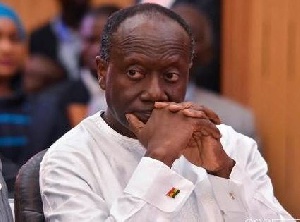The Institute of Economic Affairs (IEA) says despite government’s debt management efforts, the debt stock is still very high and unsustainable.
The IEA also made reference to a statement by International Monetary Fund (IMF) at its Spring Meeting this year, which said Ghana remained at high risk of debt distress which has implication for its creditworthiness and borrowing cost.
The IEA said: “We commend government for the debt re-profiling initiative that is aimed at minimising cost and maintaining a prudent degree of risk while helping to develop the domestic capital market.”
Government has indicated that it was likely to end the year 2017 with a debt to GDP ratio of 71 percent, about a two percentage point reduction of what was recorded last year.
The IEA said: “However, while the increasing participation of non-resident investors in the domestic bond market is laudable, particularly the foreign currency inflows that they bring to shore-up the reserve buffer, we think that it has to be managed in order not to over expose the economy to external shocks such as sudden withdrawals that can impact negatively on exchange rate stability.”
It called on government to ensure that the plan to clear the energy debt/arrears owed by energy utilities through the sale of a GH¢10 billion ($2.3 billion) local-currency bond would not lead to an increase in the public debt stock.
“Although government has said it intends to do this through a special purpose vehicle, it is still not clear in which books this debt will sit.
“We also encourage government to aggressively pursue the non-debt infrastructure financing initiative that is aimed at leveraging our untapped natural resources to bring private capital to finance major infrastructure projects.”
Highlighting that government was on track in achieving macroeconomic stability as most of the macro-indicators were moving in the right direction, the economic think-tank said the challenge, however, was the sustainability of such gains, which meant more needed to be done.
Some of the areas included aggressive domestic revenue mobilization, expenditure controls and ensuring sustainable debt management by achieving debt sustainability, which largely bothered on three critical factors – accelerating growth for base effect, closing fiscal gap to reduce the fiscal gap effect and ensuring exchange rate stability to control exchange risk and convertibility effect.
Other areas included increasing investment in growth-enhancing infrastructure and radical economic transformation to ensure export diversification.
It commended government for introducing the Fiscal Responsibility Act, which has become increasingly a common tool to enhance fiscal prudence and public expenditure transparency in many countries.
“However, the lack of monitoring and enforcement institutions to safeguard fiscal discipline and enforce adherence to such fiscal rules remains a problem.
“We will therefore urge government on to make good its promise of establishing an independent fiscal council that will, among other things, independently assess government fiscal forecasts and ensure compliance to fiscal rules.”
Business News of Tuesday, 8 August 2017
Source: dailyguideafrica.com
Debt stock still high – IEA
Entertainment











